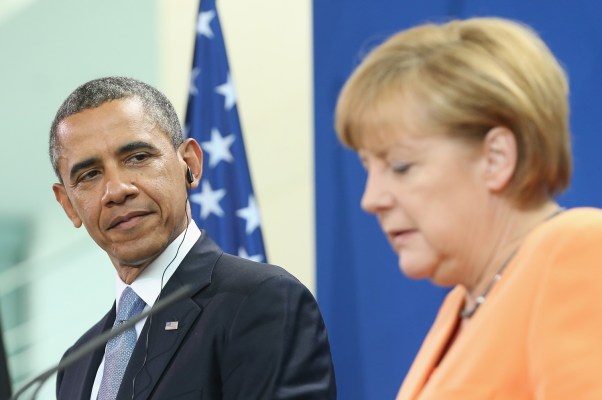The U.S. government is in a bind this week after conflicting reports have emerged regarding its surveillance of German Chancellor Merkel’s phone. According to the Wall Street Journal, government officials informed it that President Obama halted spying efforts on a number of world leaders, Merkel included, after an administration audit.
However, according to a report in German-language newspaper Bild am Sonntag, and covered in English by The Telegraph, President Obama “personally authorised the monitoring of Angela Merkel’s phone three years ago.” The program, again as reported by The Telegraph, was briefed to the president by General Keith Alexander (director of the NSA at the time), and stopped earlier this year, before a visit to Germany by the president. There has been some pushback against The Telegraph’s story, it should be noted.
In sum, either President Obama knew about the espionage of the cell phone of a key foreign leader and head of a key U.S. ally or he didn’t. The first option is bad, and the second is worse.
Naturally, governments curtail what information reaches their executive (the only other option being complete information deluge). It could be argued that the program was too small to merit attention. The Wall Street Journal reports that that was the reality:
The [government] account suggests President Barack Obama went nearly five years without knowing his own spies were bugging the phones of world leaders. Officials said the NSA has so many eavesdropping operations under way that it wouldn’t have been practical to brief him on all of them.
In my view, a program as extensive as the effort to monitor a slew of government leaders is worthy of presidential attention, but it appears that the NSA, reportedly, did not.
The muddle here is painful for the United States. Other revelations that we have built “secret spy hubs” in Berlin and other locations undercut our ability to conduct normal foreign policy with our allies. Trust is chipped at by our continued inability to keep our hands to ourselves as a nation.
Does Germany represent a foreign policy threat? Of course not. The United States has 54 military installations in the country that are publicly known, and apparently some that aren’t, in case things ever get heavy. Germany is a key economic and political ally of the United States, and has done a fine job of propping up the European continent financially and saving the euro. Our economy would be far worse off if not for Germany’s currency-lifting in recent years.
And the reward for being our official friend is that we conduct dragnet surveillance on the German people and apparently its leaders.
This is precisely why the government’s new position is corrosive. If the NSA has the authority to behave with such abandon, potentially harming a key trade bill for the entire nation through its abusive overreach without the nod of the president, then its oversight is farcical, and the agency needs to be harshly curtailed. However, if the president did sign off on the NSA’s spying on Chancellor Merkel, that was simply bad policy, and shame on the President for being so reckless.
If it became known that Germany was tapping our president’s and conducting pervasive surveillance of U.S. citizens, and had built secret spying hubs in Washington D.C., how would that make you feel? I thought so.
Photo: Getty Images
